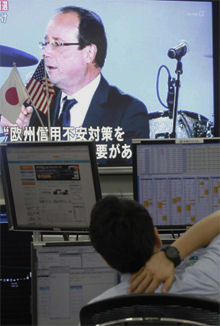Election of anti-austerity François Hollande in France and hung
parliament in Greece create uncertainty about eurozone debt crisis
Asian stock markets have been pummelled by election results in France and Greece that have heightened uncertainty about Europe's ability to solve its debt crisis.
 |
| The election of François Hollande in France and the Greek election result put Asian markets in a spin. |
The results threaten the fragile political consensus that has kept
intact Europe's currency bloc through more than two years of crisis and
raise pressure on Germany to take a more growth-oriented approach to the
crisis.
Signs of a faltering economic recovery in the US
compounded the dour mood while oil slid below $97 a barrel. Japan's
Nikkei 225 index plunged 2.6% to 9,134.26 and Hong Kong's Hang Seng fell
2.4% to 20,582.24.
The Australian dollar slipped to a four-month low near $1.0111 against the US dollar on Monday while the euro fell to its lowest level since 25 January of $1.2955.
Election
results in Greece sent tremors throughout Europe as voters punished the
parties responsible for highly unpopular austerity measures brought in
to prevent the country from defaulting on its massive debts. No
political party won enough votes to form a government, leaving the
political and financial future of the country in serious doubt.
In
France, President Nicolas Sarkozy lost to the Socialist candidate,
François Hollande, who has criticised the country's austerity programme
and wants to boost government spending.
Dariusz Kowalczyk, senior
economist at Credit Agricole CIB in Hong Kong, said the election results
were likely to heighten political instability and market volatility.
Australia's S&P/ASX 200 lost 1.8% to 4,316.20 and South Korea's Kospi shed 1.7% to 1,955.53.
"The
issue is that in Greece the outcome raises the level of uncertainty a
lot, because it's not clear who can form the government or in fact how
long they will last, and what their attitude to the current agreements
that the Greek government had reached would be," said Richard Yetsenga,
head of global markets at ANZ Research.
"The French outcome was
as expected. The markets have already shifted to a view that austerity
on its own wasn't the right policy mix and that other things needed to
be considered."
Jeff Sica, president of SICA Wealth Management,
said: "Austerity will not work to solve Europe's debt crisis. However,
shifting austerity to higher earners and business will accelerate the
debt crisis."
Merkel has invited Hollande to visit Berlin as
soon he can for a meeting that would set the groundwork for a consensus
on growth policies vital to the eurozone's future health.
"The
Merkel/Hollande initiative will never materialise due to Hollande and
Merkel being polar opposites with no chance to agree on anything," Sica
said.
Source: The Guardian.uk

